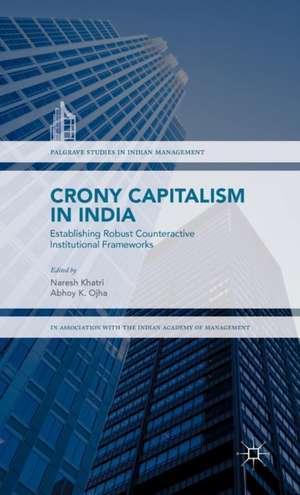Crony Capitalism in India: Establishing Robust Counteractive Institutional Frameworks: Palgrave Studies in Indian Management
Editat de Naresh Khatri, Abhoy Ojhaen Limba Engleză Hardback – 25 feb 2016
| Toate formatele și edițiile | Preț | Express |
|---|---|---|
| Paperback (1) | 636.12 lei 6-8 săpt. | |
| Palgrave Macmillan UK – 12 mar 2019 | 636.12 lei 6-8 săpt. | |
| Hardback (1) | 641.38 lei 6-8 săpt. | |
| Palgrave Macmillan UK – 25 feb 2016 | 641.38 lei 6-8 săpt. |
Preț: 641.38 lei
Preț vechi: 754.56 lei
-15% Nou
Puncte Express: 962
Preț estimativ în valută:
122.74€ • 127.67$ • 101.33£
122.74€ • 127.67$ • 101.33£
Carte tipărită la comandă
Livrare economică 14-28 aprilie
Preluare comenzi: 021 569.72.76
Specificații
ISBN-13: 9781137582867
ISBN-10: 1137582863
Pagini: 228
Ilustrații: XXIII, 228 p.
Dimensiuni: 140 x 216 x 16 mm
Greutate: 0.45 kg
Ediția:1st ed. 2016
Editura: Palgrave Macmillan UK
Colecția Palgrave Macmillan
Seria Palgrave Studies in Indian Management
Locul publicării:London, United Kingdom
ISBN-10: 1137582863
Pagini: 228
Ilustrații: XXIII, 228 p.
Dimensiuni: 140 x 216 x 16 mm
Greutate: 0.45 kg
Ediția:1st ed. 2016
Editura: Palgrave Macmillan UK
Colecția Palgrave Macmillan
Seria Palgrave Studies in Indian Management
Locul publicării:London, United Kingdom
Descriere
Crony Capitalism in India provides a comprehensive and scholarly examination of the important topic of crony capitalism, filling an important gap in the market. Bringing together experts from various backgrounds, it addresses the key underpinnings of this complex and multifarious issue. Given the emergent nature of the Indian economy, this book provides important information for decision makers in both government and business to help establish a robust institutional framework that is so desperately needed both in India and globally.
Notă biografică
Naresh Khatri is Associate Professor at the Department of Health Management and Informatics, University of Missouri, US. Before joining the University of Missouri, he was a faculty in the Department of Strategic Management and Organization at the Nanyang Business School, Nanyang Technological University, Singapore. Dr Khatri has authored two scholarly books and published around 60 research articles and book chapters in various peer-reviewed journals. He is also the Senior Associate Editor of South Asian Journal of Global Business Research and the Associate Editor of IIMB Management Review. He is on the Editorial Board of Health Care Management Review, Journal of Hospital Administration, and Journal of Management and Public Policy.
Abhoy K Ojha is a Professor in Organizational Behaviour and Human Resources Management at the Indian Institute of Management, Bangalore, India. Prior to joining IIMB he was Assistant Professor at Laurentian University, Sudbury, Canada and worked as an engineer in the Bombay Division of the Oil and Natural Gas Commission. Abhoy has been a member of many professional bodies including the Academy of Management, Administrative Sciences Association of Canada and Indian Academy of Management, and on editorial boards of journals including IIMB Management Review and South Asian Journal of Global Business Research. He has also undertaken several consulting and training assignments in the private sector as well as in the government and public sector.
Abhoy K Ojha is a Professor in Organizational Behaviour and Human Resources Management at the Indian Institute of Management, Bangalore, India. Prior to joining IIMB he was Assistant Professor at Laurentian University, Sudbury, Canada and worked as an engineer in the Bombay Division of the Oil and Natural Gas Commission. Abhoy has been a member of many professional bodies including the Academy of Management, Administrative Sciences Association of Canada and Indian Academy of Management, and on editorial boards of journals including IIMB Management Review and South Asian Journal of Global Business Research. He has also undertaken several consulting and training assignments in the private sector as well as in the government and public sector.
Textul de pe ultima copertă
Crony Capitalism in India provides a comprehensive and scholarly examination of the important topic of crony capitalism, filling an important gap in the market. Bringing together experts from various backgrounds, it addresses the key underpinnings of this complex and multifarious issue. Given the emergent nature of the Indian economy, this book provides important information for decision makers in both government and business to help establish a robust institutional framework that is so desperately needed both in India and globally.

















